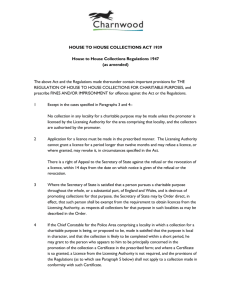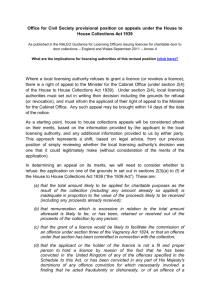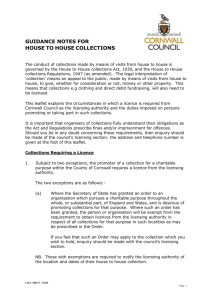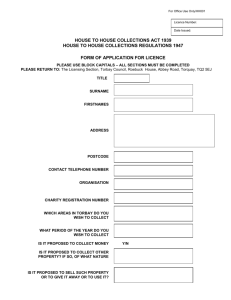House to House Collection Guidance and Application Form
advertisement
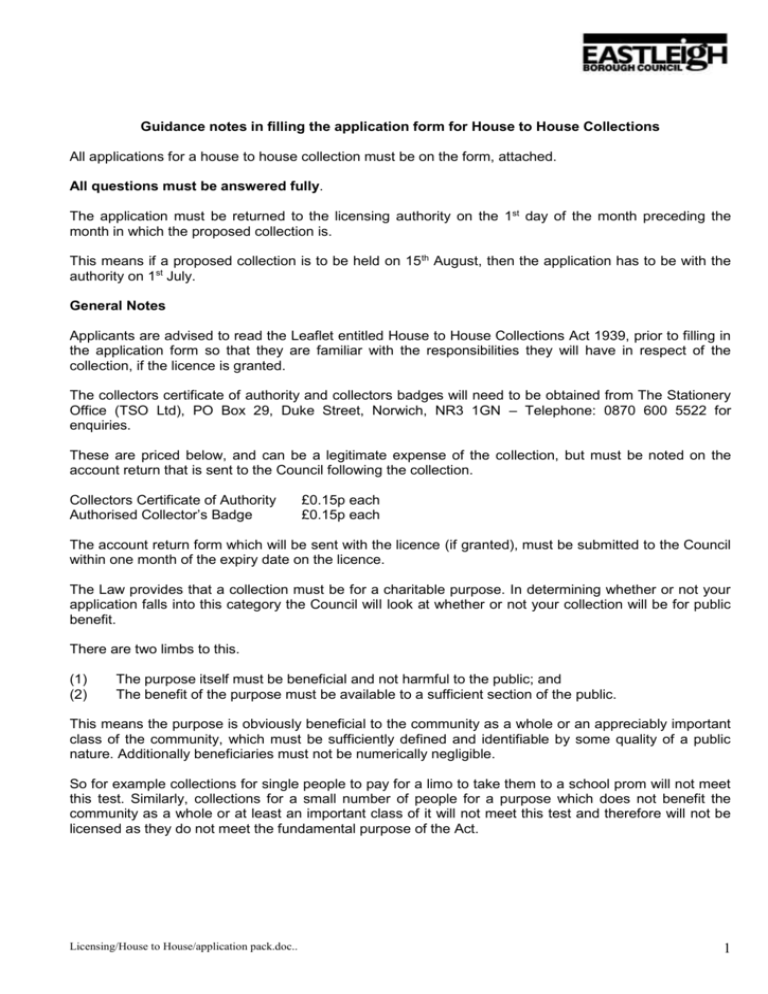
Guidance notes in filling the application form for House to House Collections All applications for a house to house collection must be on the form, attached. All questions must be answered fully. The application must be returned to the licensing authority on the 1st day of the month preceding the month in which the proposed collection is. This means if a proposed collection is to be held on 15th August, then the application has to be with the authority on 1st July. General Notes Applicants are advised to read the Leaflet entitled House to House Collections Act 1939, prior to filling in the application form so that they are familiar with the responsibilities they will have in respect of the collection, if the licence is granted. The collectors certificate of authority and collectors badges will need to be obtained from The Stationery Office (TSO Ltd), PO Box 29, Duke Street, Norwich, NR3 1GN – Telephone: 0870 600 5522 for enquiries. These are priced below, and can be a legitimate expense of the collection, but must be noted on the account return that is sent to the Council following the collection. Collectors Certificate of Authority Authorised Collector’s Badge £0.15p each £0.15p each The account return form which will be sent with the licence (if granted), must be submitted to the Council within one month of the expiry date on the licence. The Law provides that a collection must be for a charitable purpose. In determining whether or not your application falls into this category the Council will look at whether or not your collection will be for public benefit. There are two limbs to this. (1) (2) The purpose itself must be beneficial and not harmful to the public; and The benefit of the purpose must be available to a sufficient section of the public. This means the purpose is obviously beneficial to the community as a whole or an appreciably important class of the community, which must be sufficiently defined and identifiable by some quality of a public nature. Additionally beneficiaries must not be numerically negligible. So for example collections for single people to pay for a limo to take them to a school prom will not meet this test. Similarly, collections for a small number of people for a purpose which does not benefit the community as a whole or at least an important class of it will not meet this test and therefore will not be licensed as they do not meet the fundamental purpose of the Act. Licensing/House to House/application pack.doc.. 1 HOUSE TO HOUSE COLLECTIONS ACT 1939 GENERAL INFORMATION House to house collections must have a licence or an exemption. It is an offence to make a house to house collection for a charitable purpose without a licence. 1. 2. Exemptions are granted by; the Home Secretary – for a collection over a wide area (the whole of England and Wales or a substantial part of it); or the local Police – for a local collection to completed within a short period. Licences are granted by the relevant Local Authority. The term collection includes visits from house to house, and also visits to public houses, offices and factories to appeal for money, other property (for example clothes) or to sell things on the basis that part of the proceeds will go to a charity. At present these collections are regulated by the House to House Collections Act 1939, and the House to House Collections Regulations 1947 and 1963. PURPOSE The object of the Act is to provide for the regulation of house to house collections for charitable purposes and for matters connected therewith, in particular the prevention of such collections in respect of which an unduly large proportion of the proceeds is absorbed in expenses, leaving only a comparatively small sum to be actually applied to the charitable purpose. The House to House Collections Regulations have been made by the Secretary of State for regulating the manner in which collections, in respect of which licences have been granted or orders have been made under the Act, may be carried out and the conduct of promoters and collectors in relation to such collections, and prescribing forms for use under the Act. REGULATION OF CHARITABLE COLLECTIONS Any person proposing to conduct a house to house collection for a charitable purpose must obtain a) from the licensing authority for the area, either a licence authorising him to promote the collection, or a certificate of exemption granted by the police on the grounds that the purpose of the collection is local in character and the collection is likely to be completed in a short period of time, or b) from the Secretary of State, an order of exemption, in a case where a person pursues a charitable purpose throughout the whole of England, or a substantial part thereof. Where an order of the Secretary of State has been granted, the provisions of the Act and Regulations apply as they do in cases where a licence of the authority is in force, but when the licensing authority grant a certificate of exemption, the only provisions applicable are those relating to the improper use of badges, etc, and the right of a police constable to demand the name and address, etc, of a collector, and the penalties attaching thereto. LICENCES These may be granted for a period not exceeding twelve months, subject to special latitude in cases where the licensing authority wish to provide for the simultaneous expiration of licences in respect of annual collections or collections made continuously over a long period. Licensing/House to House/application pack.doc.. 2 Licences may be granted in respect of the whole, or part only, of an area, but, where a collection extends to more than one licensing area, a separate licence must be obtained from each authority to whose area the collection will extend. In this latter case, however, for convenience of administration, any necessary enquiries and supervision will usually be undertaken by the licensing authority in whose area the head office of the collecting charity is situated. A licensing authority may refuse to grant a licence, or, may revoke a licence already granted, for reasons set out in Section 2(iii) of the Act. The main reasons for which a licence may be refused or revoked are: a) That it does not appear that an adequate proportion of the proceeds of the collection will be actually applied for charitable purposes. b) That excessive remuneration is likely to be retained by any person out of the proceeds of the collection. c) That an offence under the Vagrancy Act 1984, has been committed, or might be facilitated in connection with the collection. d) That the applicant is not a fit and proper person to hold a licence by reason of a conviction under certain specified headings or for fraudulent or dishonest action. e) That the promoter has failed to exercise due diligence in the appointment of fit and proper collectors or otherwise in the administration of the collection. APPEAL AGAINST REFUSAL OR REVOCATION Any person aggrieved by the refusal to grant him a licence, or by the revocation of a licence already granted, may appeal to the Secretary of State against the decision within 14 days of the date of the notice of refusal or revocation, as shown on the notice. COLLECTORS Every collector must be furnished with: a) A Certificate of Authority, in prescribed form, duly authenticated and signed by him, on demand, to any police constable, or occupier of a house visited by him. b) A Badge, in prescribed form, giving a general indication of the purpose of the collection, to be signed by him and worn prominently when collecting. c) If money is to be collected, a Collecting Box or a Receipt Book marked with a clear indication of the purpose of the collection and a distinguishing number, which indication and number shall, in the case of a receipt book, also be marked on every receipt contained therein in addition to the consecutive number of the receipt. The certificates of authority and badges will be supplied by Her Majesty’s Stationery Office, on production of a certificate from the licensing authority, which will be supplied with, or attached to, the licence. No person under the age of 16 years shall act or be authorised to act as the collector of money. ENVELOPE COLLECTIONS Where the promoter of a collection to whom an order has been granted informs the Secretary of State that he desires to promote an envelope collection, and the Secretary of State is of the opinion that the collection is for a charitable purpose of major importance and is suitably administered, the Secretary of State may, if he thinks fit, give permission for the promotion of an envelope collection, and in such a case, the provisions of the Act and Regulations will apply subject to certain necessary adaptations. ADMINISTRATION The promoter of a collection must keep a record of certificates of authority, badges, collecting boxes and receipt books issued to collectors, and must ensure that every such certificate, badge, collecting box (with seal intact) and receipt book (with counterfoils duly completed) is returned to him, or other authorised person when the collection is completed, or when the collector ceases to act as a collector. Licensing/House to House/application pack.doc.. 3 Collecting boxes must be opened and examined in the presence of the promoter and another responsible person, or by an officer of a bank, and receipt books must be examined and checked by the promoter and another responsible person. Precise records of all moneys received or expended, and of all articles collected and disposed of, must be kept, and detailed accounts, in prescribed form must be furnished. Accounts to a licensing authority must be furnished within one month after the expiration of the licence, or within such extended period as the authority may allow. Accounts to the Secretary of State must be furnished annually so long as the order remains in force, and final accounts must be furnished within three months of the revocation of the order, or within such extended period as the Secretary of State may allow. The attention of any applicant is directed to the provisions of the House to House Regulations 1947, copies of which may be obtained form HER MAJESTY’S STATIONERY OFFICE or any official stationers. NB An application submitted to Eastleigh Borough Council Licensing Section is usually decided within 14 days of receipt of the completed application in full. All application forms should be submitted on the 1st day of the month preceding the month in which the collection is proposed. For further advice and information please contact Angela Nightingale 02380 688109 Licensing/House to House/application pack.doc.. 4 HOUSE TO HOUSE COLLECTIONS ACT 1939 Eastleigh House Upper Market St Eastleigh Hants SO50 9YN Tel: (023) 8068 8349/8109 Fax: (023) 8068 8122 DX 122381 EASTLEIGH ______________________________________________________________ APPLICATION TO EASTLEIGH BOROUGH COUNCIL In pursuance of Section 2 of the House to House Collections Act 1939, I hereby apply for a licence authorising me to promote the collection of which particulars are given below. Signature of Applicant Date PARTICULARS OF COLLECTION 1 Applicants Full Name 2a Applicants Address 2b Telephone No. 3 Particulars of charitable purpose to which proceeds of collection are to be applied. (Full particulars should be given and, where possible, the most recent account of any charity which is to benefit should be enclosed). 4 Over what parts of the Borough of Eastleigh area is it proposed that the collection should extend? 5 Dates when it is proposed that the collection should be made? 6 Is it proposed to collect money? Licensing/House to House/application pack.doc.. 5 PARTICULARS OF COLLECTION Cont’d…. 7 Is it proposed to collect other property? If so, of what nature? Is it proposed to sell such property, or to give away or to use it? 8 Approximately how many persons is it proposed to authorise to act as collectors in the area of the local authority to which the application is addressed? 9 Is it proposed that remuneration should be paid out of the proceeds of the collection:(a) to collectors? (b) To other persons? If so, to what rates and to what classes of persons? 10 Is application being made for licences for collections for the same purpose in other areas? If so, to which local authorities? Approximately how many persons in all is it proposed to authorise to act as collectors? 11 Has the applicant, or to the knowledge of the applicant, anyone associated with the promotion of the collection been refused a Licence or Order under the Act, or had a Licence or Order revoked? If so, give particulars. 12 Is it proposed to promote this collection in conjunction with a street collection? If so, it is desired that the amounts of this collection should be combined wholly or in part with the account of the street collection. 13 If the collection is for a War Charity, state if such charity has been registered under the War Charities Act 1940, and give the name of registration authority and date of registration or exemption. Please return this form to:- Angela Nightingale 02380 688109 Licensing/House to House/application pack.doc.. 6 Ethnic Monitoring Of Applicants Why do we need to do it? The Race Relations Act 1976 as amended in 2000 requires public authorities (like the Council) to: Eliminate unlawful discrimination; Promote equality of opportunity and Promote good relations between people of different racial groups. In order to do this the Council has a duty to monitor the impact of its policies and services on racial equality. Without ethnic monitoring we cannot tell whether the Council’s race equality policy is working. It can tell us whether we are offering equality of opportunity and treatment to all ethnic groups and allows us prove this to others. What Services Are Monitored? The Council has a racial equality strategy which outlines our plans for the next three years. The strategy includes plans to continue and extend monitoring. The sorts of services involved already are housing and environmental health. Monitoring can take different forms: We monitor ethnicity when people apply to the Council for services or employment; We monitor ethnicity when people complain about services; We monitor ethnicity on an going basis through surveys or customer satisfaction cards. What Will Be Monitored? Each new applicant for a licence will be asked for information about his or her ethnicity. We will also ask people their about their ethnicity when they apply for a renewal. It is not compulsory for you to provide this information and it will not affect the outcome of your application. The information you provide will be kept confidential and will only be used in collated form for monitoring purposes. Thank you for your assistance. Licensing/House to House/application pack.doc.. 7 To which of these groups do you consider you belong to? PLEASE TICK ONE BOX WHITE BLACK OR BLACK British BRITISH Irish Caribbean Any other white background (PLEASE WRITE IN) African ………………………………………… Any other black background (PLEASE WRITE IN) ………………………………………… MIXED ASIAN OR ASIAN BRITISH White & Black Caribbean Indian White & Black African Pakistani White & Asian Bangladeshi Any other mixed background (PLEASE WRITE IN) Any other Asian background (PLEASE WRITE IN) ………………………………………… ……………………………………….. Chinese Other ethnic group (PLEASE WRITE IN) ………………………………………….. Unwilling to respond Licensing/House to House/application pack.doc.. GRANTED/REFUSED 8
